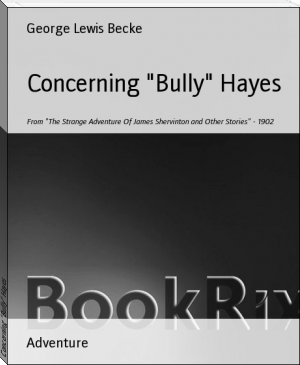Concerning "Bully" Hayes - George Lewis Becke (black books to read .TXT) 📗

- Author: George Lewis Becke
Book online «Concerning "Bully" Hayes - George Lewis Becke (black books to read .TXT) 📗». Author George Lewis Becke
But at the time the two Peruvians were cruising through the Ellices, Bully was exploiting the Paumotu Archipelago, and arousing the anger of the French authorities, by his irregular business methods. For instance, he would "buy" pearl-shell from the traders and kick them over the side if they had the audacity to ask for payment. In accordance with his custom, Bully, on this cruise, devoted a good deal of time to studying the soft-eyed Paumotuan _vahine_; and after filling his schooner with a fair amount of plunder, he did, it is stated, take away some ten or fourteen young Paumotu women--not to Chili or Peru, but merely on an extended and indefinite pleasure trip. Most of these young ladies were desirous of getting to Tahiti, where they believed their charms would be better appreciated than in their own island homes. In his characteristic way _Il capitano galantuomo_ offered them free passages. Passing through the Society Group and not entering Papeite Harbour (possibly on account of his strained relations with the French naval authorities) he made his way to the Marquesas. Here some four or five of his lady passengers elected to remain with newly-found lovers, either white or native; and Bully always blessed the union of two happy hearts by recording the affair in his humorously-kept log and giving a spree. If the bridegroom was a white man, Bully would also "buy" his oil, fungus and cotton, make him very drunk, place his laughing and blushing bride in his arms, and then, in his absent-minded way, see him over the side into his boat and sail away without paying. Bully used to say that his defective memory was the cause of all the malignant slanders set afloat about him. And, as regarded women, he used to remark he also suffered from the curious complaint of "moral astigmatism." The rest of the girls reached home somehow, after undergoing a pleasant and varied experience, each being the happy possessor of one of his peculiar and characteristically written testimonials.
It was Bully's humour to give these precious documents to the time-expired members of his harem, in the same manner as an English mistress would give a certificate of character and efficiency to a departing maid. Some of these papers are still extant in Tahiti and Mangareva. Many years ago when buying turtle at the little island of Rurutu, I saw one pasted on a doorpost in a native house. In the Western Carolines and the Pelew Group, when whale ships were plentiful and prosperous, the native girls preserved these "characters" by gumming the paper (often upside down) on a piece of pandanus leaf bordered with devices in bead-work. When a fresh ship arrived, the damsels would bind these around their pretty little foreheads after the manner of phylacteries--and they were always read with deep interest by the blubber-hunting skippers and mates and the after-guard generally. Bully's "characters" ran somewhat in this wise:--
TO ALL WHOM IT MAY CONCERN.
I, William H. Hayes, hereby certify that the bearer of this,
Marutahina of Vahitahi, was with me for four or five months,
and I can confidently say that I can recommend her to any
one in need of an active young wife, general help, or to do
chores. She is a very good girl, and the sole support of her
mother--an old thief with a tattooed back who lives on Beka
Beka.
*****
About 1871, the newspapers on the Pacific slope had a good deal to say of Bully's doings. The _Daily Alta_ of San Francisco used to speak of him as a venturesome and high-spirited American gentleman, upholding the honour of his flag in the South Seas by disregarding the hateful tyranny of petty British Consuls; while the San Francisco _Bulletin_ called him a vile and brutal miscreant who should be hanged on the same gallows with _Alabama_ Sommes and _Shenandoah_ Wardell. (Apropos of the latter gentleman, it is interesting to remember that the Melbourne (Victoria) Club gave a ball at which the adoring women cut off as souvenirs the uniform buttons of the gallant pirate and his officers.) The spitfire _Chronicle_ "claimed" that Captain William Henry Hayes was one of Nature's gentlemen, and "was certainly not the cause of a terrible affliction that had befallen the editor of a certain esteemed morning contemporary." (The wife of the editor referred to had eloped with some one.)
* * * * *
During a trading cruise in the Gambier Islands, the captain of our ship saw some young girls whom Hayes had bought from the King of Aana (one of the Chain Islands). They were very young, very scantily dressed, and without doubt very beautiful. They were always chaperoned, day and night, by two old women. One of these ancient dames named Tuna (the Eel) told our captain that, by and by, the "big captain" would come and take them. Tuna had quite a fund of anecdotes about Bully, whom she regarded as immeasurably superior to any white man she had ever seen. When she was a young and giddy girl of sixteen, she had been much admired, so she said, by Lord John--and the officers of His Majesty's ship --------. Bully Hayes, she believed, was Lord John's spirit returned in another and much stronger body and better shape; and just as she had fallen in love with the man-of-war captain, so had all the Aana girls with his latter-day double.
* * * * *
At this time, the only white man on the island was a young American lad of about nineteen, and Tuna, and her long-haired, dark-eyed "boarding-school" came to his house, where they sat on an upturned canoe and drank stone-gin (Tuna took hers neat) while teaching him to pronounce properly the Paumotu language. Heavens! what eyes those girls possessed! Like stars they glowed with slumbering liquid fire--the fire of a quick-blooded and passionate race. Any one of these five island girls, our chief mate used to say, would have utterly demoralised even a Trappist monastery, had the holy brothers seen her face peeping in during their devotions. This island, Nukutavake, had but few inhabitants, most of whom had been brought there by Hayes, who, they said, would come again in a year or so, and take them back to Aana and Maga-Beva. They were all political offenders, and to escape death they besought Bully to take them to Nukutavake until "the wrath of the chiefs was dead." Bully, who had an idea that there was a lot of pearl-shell on Nukutavake, gave them all a passage, and also the two old women and the girls before mentioned. One of the latter, Talalua, told the young trader that Kapeni Hesi (Hayes) would have taken her with him but the ship was too small, and he had no more room, and there were two girls from Huaheine--"dogs with much gold in their ears "--with him, who threatened to give her to the sharks if she came aboard. During our stay at this island a schooner from Tahiti came to an anchor, and we learnt from the young American that he was to be removed to another island called Vairaatea. He sailed the following morning, and his departure was marked by the tearful farewells of Bully's beauties and old Tuna, who embraced him and rubbed noses, and wept gin-odorous tears of unalloyed gratitude when he gave her three bottles of liquor. To each of Hayes's nymphs he also presented a piece of book muslin (twelve yards each) and a bottle of musk valued at 2 dollars a bottle. Talalua and Marami each gave him some splendid pieces of hawk-bill shell, and the others contributed among them a silver ring. Poor girls! they had no more to give--a grass _titi_ round their shapely loins and a few silver or gold rings, and ear pendants, being all their worldly wealth and clothing combined. Our young friend was solemnly cautioned never to let Kapeni Hesi know about the turtle-shell and other gifts, or his anger would "eat them up."
On hearing of this farewell testimonial business, the skipper of the schooner that was taking the young fellow away became greatly excited--Hayes, he said, would put his own construction on the gifts. To this, in his youthful innocence, the youth replied that he didn't care, as it was his business to make a present if he chose; whereupon the skipper, a jolly old sea-dog named Tom English, told him that that was all very well, but that he (English) would be looked upon as an accessory, and Hayes would make him suffer for it when they met again.
"Accessory to what?" said the wondering youth.
"D---- your thick skull, you young ass, why, accessory to makin' love to his girls."
This amused us immensely, but as the lad saw that English was serious, and was equally determined not to take the presents back, he wrote a note as follows and showed it to the old fellow, who said it might possibly pass with Bully:--
Below this he added:--
Capt. Hayes,
Dear ------ The above-mentioned I have supplied as per bill.
I will feel obliged if you will pay the 120.00 to any of our
firm's vessels on my account, I hope that, as I have not
charged you native prices, you will pay me soon,
Yours, Ac.
He then handed the bill to old Tuna, and told her that she must give it to the captain when he reached Nukutavake. When he did meet Bully a long time afterwards in Samoa, Hayes paid up like a man. But long before this old Tuna had given the trader's bill and letter to Hayes. Two years later the young trader found awaiting him at the American Consulate at Tahiti, the following letter:--
Mr. ------
Dear Sir,--I received your note and bill for supplying some
of my household with some rotten cheese-cloth out of your
store, which you have the infernal impertinence to call
muslin; also, five bottles of stinking bilge-water, labelled
musk. I don't know who you are, but you can tell your
employers from me, that I will see them roasted before I
will give my good money for their filthy and disgusting
Sydney trade goods, and when I drop across you, you will get
a head put on you that will teach you not to again presume
to interfere in my domestic affairs.
Yours very sincerely,
Wm. Henry Hayes.
III
Three or four years passed by, during which time the writer cruised about from island to island in the North and South Pacific--sometimes living ashore as a trader, sometimes voyaging to and fro among the many groups as supercargo or recruiter in the labour trader; and then one day the schooner, in which I then served as supercargo, reached Samoa, and there I accepted the dignified but unsatisfactory financial





Comments (0)